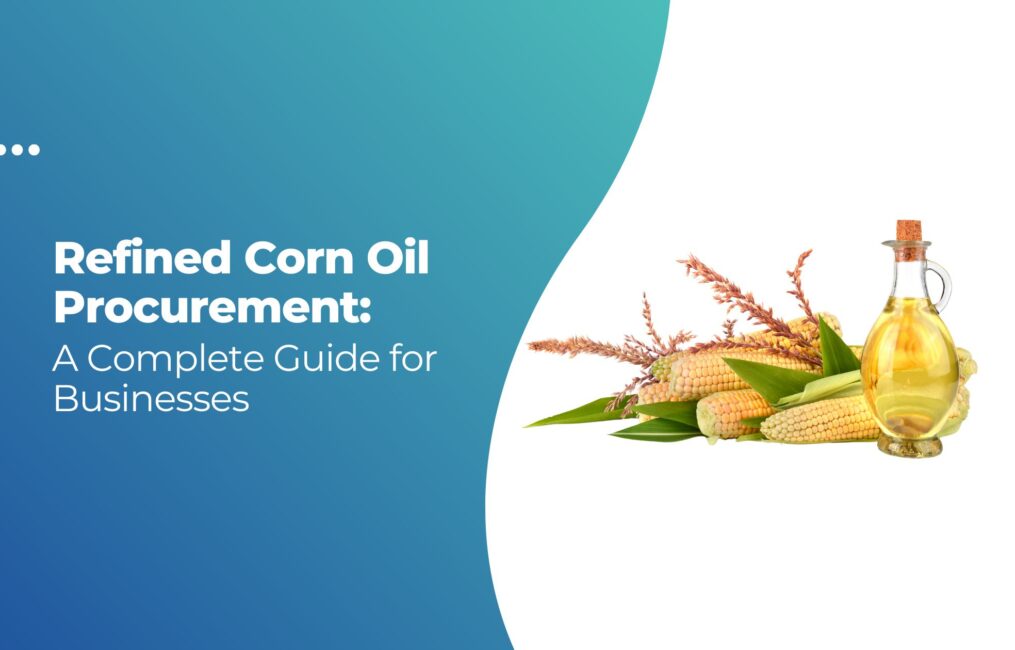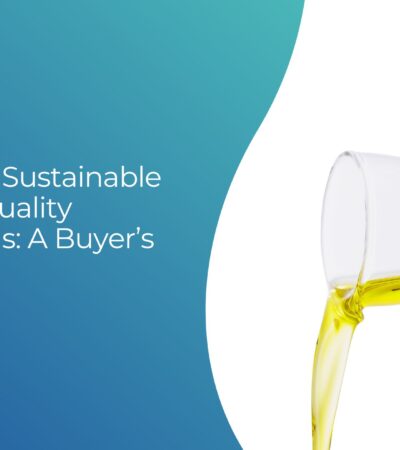Refined Corn Oil Procurement: A Complete Guide for Businesses

Edible oils are among the most essential commodities in the global food and industrial supply chain. They are not only a household necessity for cooking but also play a critical role in food processing, pharmaceuticals, and cosmetics. The global edible oil market continues to expand, driven by changing consumer preferences, health awareness, and the rapid growth of packaged and processed foods.
Among these oils, refined corn oil has gained significant attention due to its versatility, health benefits, and wide industrial applications. Extracted from the germ of corn kernels, refined corn oil is valued for its neutral flavor, light texture, and high smoke point, making it a preferred choice in frying, baking, and snack production. Beyond the food industry, it is also widely used in pharmaceuticals and cosmetics for its stability and beneficial nutrient profile.
For businesses, corn oil procurement is more than a purchasing activity—it is a strategic decision that affects cost efficiency, product quality, and brand reputation. With market volatility, rising demand, and increasing emphasis on sustainable sourcing, companies must take a structured approach to edible oil procurement.
This guide provides food manufacturers, industrial buyers, and procurement managers with a complete overview of refined corn oil: its qualities, applications, market trends, procurement challenges, and best practices.
What is Refined Corn Oil?
Refined corn oil is produced from the germ of corn kernels. The process begins with the extraction of crude corn oil, which undergoes a refining process to remove impurities, free fatty acids, and unwanted compounds. This refining makes the oil stable, light, and suitable for both food and industrial use.
One of the key qualities of refined corn oil is its neutral taste and light texture, which allows it to blend seamlessly with a variety of foods without altering flavors. It also has a high smoke point (around 450°F/232°C), making it an excellent option for deep frying, sautéing, and high-heat cooking.
Nutritionally, refined corn oil is considered heart-friendly. It is naturally cholesterol-free, contains high levels of polyunsaturated fatty acids (PUFAs), and is rich in Vitamin E, which functions as a powerful antioxidant. These properties make it popular among health-conscious consumers and food processors aiming to position their products as healthier alternatives.
Applications of refined corn oil are diverse:
- Food processing: frying oils, bakery fats, margarine, salad dressings, and snack production.
- Industrial use: cosmetics, skincare products, and pharmaceuticals, where its emollient and stable nature adds value.
Compared to other edible oils like sunflower, soybean, palm, and canola, refined corn oil stands out for its balanced nutritional profile, heat stability, and consumer perception as a healthier option.
Global Market Overview of Corn Oil
The global edible oil market has seen steady growth, with refined corn oil carving out a stronger share due to its increasing demand in food, pharma, and cosmetics sectors.
Major producers of corn oil include the United States, China, Brazil, India, and countries in the European Union. The U.S. remains a global leader due to large-scale corn production and advanced processing facilities. India and China, as leading consumers, also play a significant role in driving demand.
Market demand trends reveal that refined corn oil is gaining traction in food manufacturing, especially in the bakery and snack industries. Additionally, rising health awareness is pushing consumers and food processors to prefer oils rich in Vitamin E and polyunsaturated fats. In the non-food sector, pharmaceutical and cosmetic companies are increasingly incorporating corn oil for its emollient properties.
Import-export dynamics show that refined corn oil is becoming a growing segment of the edible oil trade. While local production meets part of the demand, many countries rely on imports to maintain supply stability, particularly in Asia and the Middle East.
Looking ahead, the market forecast is promising. With urbanization, rising disposable incomes, and the expanding packaged food industry, the demand for corn oil procurement is expected to rise steadily. Businesses investing in this segment can benefit from both short-term cost opportunities and long-term growth prospects.
Why Businesses Prefer Refined Corn Oil
Businesses across the food and industrial sectors increasingly prefer refined corn oil because of its unique functional and commercial benefits.
- Functional benefits: Its high smoke point ensures stability during high-heat cooking, making it ideal for frying and food processing. Its light, neutral taste allows food manufacturers to maintain flavor consistency across products.
- Health appeal: Consumer demand for healthier oils is steadily rising. Refined corn oil, with its cholesterol-friendly and antioxidant-rich profile, meets this expectation, helping manufacturers position their products as premium and health-conscious.
- Industrial versatility: Apart from food, refined corn oil is cost-effective for use in cosmetics and pharmaceuticals, further adding to its procurement value.
- Branding advantage: For manufacturers, using refined corn oil offers marketing leverage, as it aligns with consumer preferences for safe, stable, and healthier edible oils.
These combined benefits make refined corn oil a reliable and profitable choice in edible oil procurement strategies for businesses worldwide.
Challenges in Corn Oil Procurement
Despite its advantages, corn oil procurement comes with several challenges that businesses must manage carefully.
- Price Volatility
Corn oil prices are influenced by corn production levels, demand from the biofuel industry (corn is also used for ethanol), and global commodity trends. Sudden spikes or drops in prices can disrupt procurement budgets.
- Supply Chain Risks
Logistics disruptions, geopolitical conflicts, and raw material shortages often affect global edible oil trade. A heavy dependence on imports in some regions increases the risk of procurement delays.
- Quality Assurance
Variation in refining processes and risks of adulteration can impact the consistency of refined corn oil. Businesses must ensure suppliers adhere to food safety certifications like FSSAI, ISO, HACCP, or FDA guidelines.
- Regulatory Compliance
Different countries impose varying standards on food-grade oils. Non-compliance can result in fines, import restrictions, or product recalls—significantly harming brand trust.
- Sustainability Concerns
Corn farming has environmental impacts, including soil degradation and water usage. Businesses today face pressure from both regulators and consumers to prioritize sustainable oil sourcing.
Managing these challenges requires a structured approach to edible oil procurement, where risk assessment, supplier evaluation, and long-term planning play a vital role.
Strategic Approaches to Corn Oil Procurement
To overcome procurement challenges and maximize value, businesses need a strategic approach when sourcing refined corn oil. Below are key strategies that procurement managers and manufacturers should adopt:
a) Selecting Reliable Bulk Corn Oil Suppliers
The cornerstone of effective procurement is choosing suppliers with a proven track record. Businesses should evaluate potential partners on the basis of:
- Production capacity and consistency
- Certifications and compliance with food safety standards
- Reputation in the global edible oil market
Working with bulk corn oil suppliers ensures economies of scale and reliable delivery schedules.
b) Importance of Certifications and Quality Standards
Quality cannot be compromised in edible oil procurement. Certifications like FSSAI, ISO 22000, HACCP, and FDA are vital markers of supplier reliability. Regular audits, batch testing, and traceability systems add another layer of assurance.
c) Negotiating Long-Term Contracts vs. Spot Procurement
Spot purchases may seem attractive during periods of low prices but are risky in volatile markets. Strategic buyers often sign long-term contracts with trusted suppliers, ensuring predictable costs and stable supply. Hybrid models—combining long-term agreements with occasional spot buys—offer balance.
d) Leveraging Technology in Procurement
Digital procurement platforms, ERP systems, and AI-driven demand forecasting tools are transforming procurement. By analyzing historical data and market signals, businesses can forecast demand, optimize order cycles, and negotiate better terms with suppliers.
e) Risk Management Strategies
Risk management is central to edible oil procurement. This includes:
- Supplier diversification: sourcing from multiple regions to avoid overdependence.
- Inventory planning: maintaining buffer stocks to counter supply chain disruptions.
- Insurance and hedging: financial tools to minimize exposure to commodity price volatility.
Case Example: A leading FMCG company diversified its sourcing of refined corn oil across three countries, signed multi-year contracts, and integrated AI-based forecasting. This reduced procurement costs by 12% while ensuring uninterrupted supply during market fluctuations.
In summary, businesses that take a structured and technology-driven approach to corn oil procurement strategies gain a competitive edge in cost efficiency, quality, and reliability.
The Future of Refined Corn Oil Procurement
The future of refined corn oil procurement is being shaped by sustainability, digitalization, and transparency.
- Sustainable and Traceable Procurement: Growing consumer demand for ethical sourcing will push businesses to adopt sustainable farming practices and partner with eco-conscious suppliers. Traceability, where every batch of corn oil can be tracked to its origin, will become standard.
- Digitalization: Procurement will increasingly move to e-marketplaces, with AI and blockchain playing major roles. Blockchain ensures secure and transparent supply chains, while AI supports predictive demand planning.
- Farmer-to-Business Supply Chains: Emerging models will allow companies to source directly from farmers and cooperatives, reducing intermediaries and ensuring fair trade.
- Rising Demand in Food & Pharma: With global demand for healthier edible oils and natural ingredients, refined corn oil is expected to grow in both the food and pharmaceutical sectors.
Businesses that adapt to these trends—by embracing technology, sustainability, and supplier partnerships—will future-proof their oil procurement business strategies.
How Neshiel Supports Businesses in Corn Oil Procurement
At Neshiel Agrochem, we understand that procurement is not just about buying—it is about creating value for businesses. As a trusted corn oil procurement partner, we bring decades of expertise and a strong global network to support manufacturers, food processors, and industrial buyers.
- Global Supplier Network: Neshiel works with certified, reliable suppliers to ensure high-quality and consistent supply of refined corn oil.
- Quality and Compliance: We prioritize international food safety standards (FSSAI, ISO, HACCP, FDA), guaranteeing that every batch meets regulatory requirements.
- Tailored Procurement Solutions: From long-term contracts to flexible sourcing models, we provide customized solutions for businesses of all sizes.
- Market Insights and Risk Management: Our team constantly tracks global edible oil markets, price fluctuations, and trade regulations, offering clients actionable insights for smarter procurement.
- Value-Added Services: Beyond supply, we assist in cost optimization, logistics coordination, and building resilient supply chains.
By partnering with Neshiel, businesses gain not only access to refined corn oil suppliers but also a procurement ally committed to transparency, efficiency, and long-term success.
Conclusion
Refined corn oil is more than just another edible oil—it is a versatile, nutritious, and industrially valuable commodity that continues to gain global importance. For food manufacturers, pharmaceutical companies, and cosmetic producers, making the right choices in corn oil procurement directly influences product quality, cost efficiency, and brand reputation.
This guide has highlighted why businesses must approach procurement strategically—understanding the qualities of refined corn oil, market dynamics, procurement challenges, and future trends. From ensuring reliable supply to embracing sustainability and leveraging technology, companies that prioritize procurement strategy will enjoy a competitive advantage.
Partnering with trusted procurement companies like Neshiel Agrochem ensures businesses can focus on growth while experts manage sourcing, compliance, and market risks.
In a rapidly changing global edible oil market, businesses that invest in smart and sustainable edible oil procurement today will be best positioned for long-term success.





